SAGACITY//////////////////////////////////////////
Hi,I'm Sirthea am expert on courses like;Nursing,Law,Psychology,Human Resource Management.I will be providing you with quality study materials everyday.I do ensure scolarly standards in my documents and i assure you a GOOD GRADE if you use my study resources.Please Don't forget to Review after using my resources.Thank You!
- 587
- 0
- 19
Community
- Followers
- Following
1 Reviews received
610 items

test-bank-principles-of-anatomy-and-physiology-11th-edition-tortora
1) Grant and Gray made extensive studies of the structure of the entire human body and produced atlases documenting their work. Grant and Gray were A) embryologists B) histologists C) neurophysiologists D) gross anatomists E) endocrinologists Answer: D Reference: Page 2, Anatomy and Physiology Defined Difficulty: Easy 2) Many scientists and physicians devote their lives to understanding how the body works. These researchers are classified as A) anatomists B) histologists C) ...
- Package deal
- Exam (elaborations)
- • 30 pages •
1) Grant and Gray made extensive studies of the structure of the entire human body and produced atlases documenting their work. Grant and Gray were A) embryologists B) histologists C) neurophysiologists D) gross anatomists E) endocrinologists Answer: D Reference: Page 2, Anatomy and Physiology Defined Difficulty: Easy 2) Many scientists and physicians devote their lives to understanding how the body works. These researchers are classified as A) anatomists B) histologists C) ...

test-bank-principles-of-anatomy-and-physiology-11th-edition-tortora
1) Grant and Gray made extensive studies of the structure of the entire human body and produced atlases documenting their work. Grant and Gray were A) embryologists B) histologists C) neurophysiologists D) gross anatomists E) endocrinologists Answer: D Reference: Page 2, Anatomy and Physiology Defined Difficulty: Easy 2) Many scientists and physicians devote their lives to understanding how the body works. These researchers are classified as A) anatomists B) histologists C) ...
- Exam (elaborations)
- • 30 pages •
1) Grant and Gray made extensive studies of the structure of the entire human body and produced atlases documenting their work. Grant and Gray were A) embryologists B) histologists C) neurophysiologists D) gross anatomists E) endocrinologists Answer: D Reference: Page 2, Anatomy and Physiology Defined Difficulty: Easy 2) Many scientists and physicians devote their lives to understanding how the body works. These researchers are classified as A) anatomists B) histologists C) ...

test-bank-principles-of-anatomy-and-physiology-11th-edition-tortora
1) Grant and Gray made extensive studies of the structure of the entire human body and produced atlases documenting their work. Grant and Gray were A) embryologists B) histologists C) neurophysiologists D) gross anatomists E) endocrinologists Answer: D Reference: Page 2, Anatomy and Physiology Defined Difficulty: Easy 2) Many scientists and physicians devote their lives to understanding how the body works. These researchers are classified as A) anatomists B) histologists C) ...
- Exam (elaborations)
- • 30 pages •
1) Grant and Gray made extensive studies of the structure of the entire human body and produced atlases documenting their work. Grant and Gray were A) embryologists B) histologists C) neurophysiologists D) gross anatomists E) endocrinologists Answer: D Reference: Page 2, Anatomy and Physiology Defined Difficulty: Easy 2) Many scientists and physicians devote their lives to understanding how the body works. These researchers are classified as A) anatomists B) histologists C) ...

Test Bank for Anatomy and Physiology for Health Professions An Interactive Journey 2nd Edition Colbe.
1) Knowing the exact body region of a sign or symptom can help a health care worker determine the . 1) A) Proper medication B) Proper diagnosis C) Extent of injury D) Patient's size 2) A body in the prone position is . 2) A) Face up B) On right side C) On left side D) Face down 3) A plane is an imaginary line dividing the body into . 3) A) Sections B) Tissues C) Organs D) Squares 4) Directional terms are used ...
- Package deal
- Exam (elaborations)
- • 30 pages •
1) Knowing the exact body region of a sign or symptom can help a health care worker determine the . 1) A) Proper medication B) Proper diagnosis C) Extent of injury D) Patient's size 2) A body in the prone position is . 2) A) Face up B) On right side C) On left side D) Face down 3) A plane is an imaginary line dividing the body into . 3) A) Sections B) Tissues C) Organs D) Squares 4) Directional terms are used ...
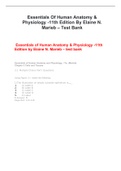
Essentials Of Human Anatomy & Physiology -11th Edition By Elaine N. Marieb – Test Bank
1) The illustration of simple cuboidal epithelium is _. 1. A) Label A 2. B) Label B 3. C) Label C 4. D) Label D 5. E) Label E Answer: B Page Ref: 113-114 Bloom’s: 1) Knowledge 2) The illustration of skeletal muscle tissue is _ . 1. A) Label A 2. B) Label B 3. C) Label C 4. D) Label D 5. E) Label E Answer: E Page Ref: 121-122 Bloom’s: 1) Knowledge 3) The illustration of stratified squamous epithelium is . 1. A) Label A 2. B) Label B 3. C) Label C 4. D) Label D 5. E...
- Exam (elaborations)
- • 53 pages •
1) The illustration of simple cuboidal epithelium is _. 1. A) Label A 2. B) Label B 3. C) Label C 4. D) Label D 5. E) Label E Answer: B Page Ref: 113-114 Bloom’s: 1) Knowledge 2) The illustration of skeletal muscle tissue is _ . 1. A) Label A 2. B) Label B 3. C) Label C 4. D) Label D 5. E) Label E Answer: E Page Ref: 121-122 Bloom’s: 1) Knowledge 3) The illustration of stratified squamous epithelium is . 1. A) Label A 2. B) Label B 3. C) Label C 4. D) Label D 5. E...
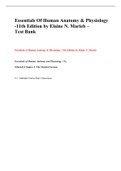
Essentials Of Human Anatomy & Physiology -11th Edition by Elaine N. Marieb – Test Bank
1) The proximal epiphysis is represented by . 1. A) Label H 2. B) Label C 3. C) Label A 4. D) Label B 5. E) Label F Answer: D Page Ref: 162 Bloom’s: 1) Knowledge 2) The area that causes the lengthwise growth of a long bone is indicated by . 1. A) Label F 2. B) Label D 3. C) Label A 4. D) Label E 5. E) Label C Answer: D Page Ref: 161, 162 Bloom’s: 2) Comprehension 3) The area that serves as a storage area for fat in adults is indicated by ....
- Exam (elaborations)
- • 107 pages •
1) The proximal epiphysis is represented by . 1. A) Label H 2. B) Label C 3. C) Label A 4. D) Label B 5. E) Label F Answer: D Page Ref: 162 Bloom’s: 1) Knowledge 2) The area that causes the lengthwise growth of a long bone is indicated by . 1. A) Label F 2. B) Label D 3. C) Label A 4. D) Label E 5. E) Label C Answer: D Page Ref: 161, 162 Bloom’s: 2) Comprehension 3) The area that serves as a storage area for fat in adults is indicated by ....
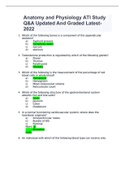
Anatomy and Physiology ATI Study Q&A Updated And Graded Latest-2022
1. Which of the following bones is a component of the appendicular skeleton? a) Xyphoid process b) Symphysis pubis c) sacrum d) sternum 2. Testosterone production is regulated by which of the following glands? a) Pineal b) Thymus c) Parathyroid d) Pituitary 3. Which of the following is the measurement of the percentage of red blood cells in whole blood? a) Hematocrit b) Hemoglobin c) Mean corpuscular volume d) Reticulocyte count 4. Which of the following structure of the gas...
- Exam (elaborations)
- • 10 pages •
1. Which of the following bones is a component of the appendicular skeleton? a) Xyphoid process b) Symphysis pubis c) sacrum d) sternum 2. Testosterone production is regulated by which of the following glands? a) Pineal b) Thymus c) Parathyroid d) Pituitary 3. Which of the following is the measurement of the percentage of red blood cells in whole blood? a) Hematocrit b) Hemoglobin c) Mean corpuscular volume d) Reticulocyte count 4. Which of the following structure of the gas...
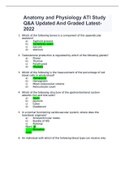
Anatomy and Physiology ATI Study Q&A Updated And Graded Latest-2022
1. Which of the following bones is a component of the appendicular skeleton? a) Xyphoid process b) Symphysis pubis c) sacrum d) sternum 2. Testosterone production is regulated by which of the following glands? a) Pineal b) Thymus c) Parathyroid d) Pituitary 3. Which of the following is the measurement of the percentage of red blood cells in whole blood? a) Hematocrit b) Hemoglobin c) Mean corpuscular volume d) Reticulocyte count 4. Which of the following structure of the gas...
- Exam (elaborations)
- • 10 pages •
1. Which of the following bones is a component of the appendicular skeleton? a) Xyphoid process b) Symphysis pubis c) sacrum d) sternum 2. Testosterone production is regulated by which of the following glands? a) Pineal b) Thymus c) Parathyroid d) Pituitary 3. Which of the following is the measurement of the percentage of red blood cells in whole blood? a) Hematocrit b) Hemoglobin c) Mean corpuscular volume d) Reticulocyte count 4. Which of the following structure of the gas...
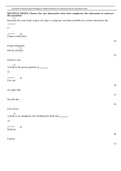
Test-Bank-for-Anatomy-and-Physiology-for-Health-Professions-An-Interactive-Journey-2nd-Edition-Colbe
1) Knowing the exact body region of a sign or symptom can help a health care worker determine the . 1) A) Proper medication B) Proper diagnosis C) Extent of injury D) Patient's size 2) A body in the prone position is . 2) A) Face up B) On right side C) On left side D) Face down 3) A plane is an imaginary line dividing the body into . 3) A) Sections B) Tissues C) Organs D) Squares 4) Directional terms are used as...
- Exam (elaborations)
- • 30 pages •
1) Knowing the exact body region of a sign or symptom can help a health care worker determine the . 1) A) Proper medication B) Proper diagnosis C) Extent of injury D) Patient's size 2) A body in the prone position is . 2) A) Face up B) On right side C) On left side D) Face down 3) A plane is an imaginary line dividing the body into . 3) A) Sections B) Tissues C) Organs D) Squares 4) Directional terms are used as...
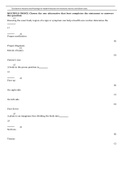
Test-Bank-for-Anatomy-and-Physiology-for-Health-Professions-An-Interactive-Journey-2nd-Edition-Colbe
1) Knowing the exact body region of a sign or symptom can help a health care worker determine the . 1) A) Proper medication B) Proper diagnosis C) Extent of injury D) Patient's size 2) A body in the prone position is . 2) A) Face up B) On right side C) On left side D) Face down 3) A plane is an imaginary line dividing the body into . 3) A) Sections B) Tissues C) Organs D) Squares 4) Directional terms are used as...
- Exam (elaborations)
- • 30 pages •
1) Knowing the exact body region of a sign or symptom can help a health care worker determine the . 1) A) Proper medication B) Proper diagnosis C) Extent of injury D) Patient's size 2) A body in the prone position is . 2) A) Face up B) On right side C) On left side D) Face down 3) A plane is an imaginary line dividing the body into . 3) A) Sections B) Tissues C) Organs D) Squares 4) Directional terms are used as...

ECS1501 EXAM PACK NOTES & PAST QUESTION WITH SOLUTIONS